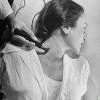"Learned helplessness is a psychological condition in which a human or animal has learned to believe that it is helpless. It thinks that it has no control over its situation and that whatever it does is futile. As a result it will stay passive when the situation is unpleasant or harmful and damaging." (Wikipedia)
I think about those who are said to have "learned helplessness" and ask myself, who taught it to them? Why, it's Martin Seligman, father of positivist psychology, advisor to torturers [1] who coined the term "learned helplessness" (Seligman, 1998, 1975). The lack of ethics involved in Seligman's now famous "experiment' echoes through decades even as he denies supporting torture [2] today. This lack reflects too in psychiatric services as well as in military institutions. The connection is too brightly drawn between Martin the dog torturer, Martin, the lecturer to SERE [3] (Mayer, 2008) and Martin, the father of "positive" psychology. But, denial surrounding these connections is hardly unique to Martin. Often its spore exists only in language, the way we talk about the "other". That language, dismissive, hopeless, is applied to people in various kinds of intractable distress. That language is applied to people so disenfranchised that they might well be without any voice.
Empowerment, recovery, agency all butt up against extreme curtailment of choice at the point where risk must be taken in order for growth to occur. Through control and containment of what is perceived as out of control or about to be out of control, helplessness is taught. Through "black sites' and Guantanamo, helplessness is taught. Through labeling and long term captivity, tortured and troubled people alike are taught so well that they often never work, marry, have children. People, whether they gain their experience in help seeking or in an illegal prison, when and wherever they are diagnosed and treated, lose the dignity of risk (Chamberlain, 1978.)
The longer a person is "in the system" the more they are likely to say what they have come to know the system demands that they must say. The treatment team is the Inquisition, the psychiatrist the Grand Inquisitor. Like a torture survivor, one must only learn how to join in.
I recall a piece of history, T-4 experiments, (Lifton, 1986) the first people who were killed, those described in Mein Kampf (Hitler, 1925) as "life unworthy of life", were those diagnosed with a mental condition. Nothing remotely as dramatic as that is happening here. Or, is it?
We have "human rights" on the books. Unless they are "clinically" contraindicated.
And so I ask myself, should not the people who must bare this language be more accurately characterized as having "taught helplessness" rather than "learned helplessness?" And should not we more aptly be focused on how that helplessness is taught, by whom and to what end?
Bibliography
Seligman, M.E.P., Learned Optimism: How to Change Your Mind and Your Life, Free Press, A Division of Simon and Schuster, 1998
Seligman, M.E.P., Helplessness: On Depression, Development, and Death, W.H. Freeman, 1975
Chamberlain, Judi, On Our Own: Patient Controlled Alternatives to the Mental Health System, Hawthorne Press, 1978.
Hitler, Adolf, Mein Kampf: New York, Reynal & Hitchcock, 1940, (first published in German in 1925)
Lifton, Robert Jay, The Nazi Doctors: Medical Killing and the Psychology of Genocide, KeVa Books, LLC, 1986
Mollica, Richard, Healing Invisible Wounds: Paths to Hope and Recovery in a Violent World: Harcourt, Inc., 2006Internet Bibliography
http://en.wikipedia.org/wiki/Learned_helplessness
www. opednews .com/articles/ "- Torture - in-the-Dark
(Note: You can view every article as one long page if you sign up as an Advocate Member, or higher).






